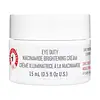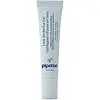What's inside
What's inside
 Key Ingredients
Key Ingredients

 Benefits
Benefits

 Concerns
Concerns

 Ingredients Side-by-side
Ingredients Side-by-side

Water
Skin ConditioningDimethicone
EmollientGlycerin
HumectantMaris Aqua
HumectantButylene Glycol
HumectantNiacinamide
SmoothingPolysilicone-11
Caprylic/Capric Triglyceride
MaskingMica
Cosmetic ColorantPanthenol
Skin ConditioningGigartina Stellata/Kappaphycus Alvarezii Extract
Skin ProtectingSodium Ascorbyl Phosphate
AntioxidantCoffea Arabica Seed Extract
MaskingSodium Hyaluronate
HumectantCaffeine
Skin ConditioningCucurbita Pepo Seed Extract
Skin ConditioningCorallina Officinalis Extract
Skin ConditioningGlycyrrhiza Glabra Root Extract
BleachingChrysanthemum Parthenium Extract
Skin ConditioningCamellia Sinensis Leaf Extract
AntimicrobialTocopherol
AntioxidantPhytosteryl/Octyldodecyl Lauroyl Glutamate
Skin ConditioningSodium Acrylates Copolymer
Hydroxyacetophenone
AntioxidantGlyceryl Polyacrylate
Squalane
EmollientHydrogenated Polycyclopentadiene
Polyacrylate Crosspolymer-6
Emulsion StabilisingLecithin
EmollientHydroxyethyl Acrylate/Sodium Acryloyldimethyl Taurate Copolymer
Emulsion StabilisingCaprylyl Glycol
EmollientLinoleic Acid
CleansingPhytosteryl Canola Glycerides
Skin ConditioningSilica
AbrasiveHexylene Glycol
EmulsifyingPalmitic Acid
EmollientOleic Acid
EmollientStearic Acid
CleansingSorbitan Isostearate
EmulsifyingPolysorbate 60
EmulsifyingTriolein
Skin ConditioningT-Butyl Alcohol
PerfumingPhenoxyethanol
PreservativeSodium Benzoate
MaskingPotassium Sorbate
PreservativeCitric Acid
BufferingCI 77891
Cosmetic ColorantCI 77491
Cosmetic ColorantWater, Dimethicone, Glycerin, Maris Aqua, Butylene Glycol, Niacinamide, Polysilicone-11, Caprylic/Capric Triglyceride, Mica, Panthenol, Gigartina Stellata/Kappaphycus Alvarezii Extract, Sodium Ascorbyl Phosphate, Coffea Arabica Seed Extract, Sodium Hyaluronate, Caffeine, Cucurbita Pepo Seed Extract, Corallina Officinalis Extract, Glycyrrhiza Glabra Root Extract, Chrysanthemum Parthenium Extract, Camellia Sinensis Leaf Extract, Tocopherol, Phytosteryl/Octyldodecyl Lauroyl Glutamate, Sodium Acrylates Copolymer, Hydroxyacetophenone, Glyceryl Polyacrylate, Squalane, Hydrogenated Polycyclopentadiene, Polyacrylate Crosspolymer-6, Lecithin, Hydroxyethyl Acrylate/Sodium Acryloyldimethyl Taurate Copolymer, Caprylyl Glycol, Linoleic Acid, Phytosteryl Canola Glycerides, Silica, Hexylene Glycol, Palmitic Acid, Oleic Acid, Stearic Acid, Sorbitan Isostearate, Polysorbate 60, Triolein, T-Butyl Alcohol, Phenoxyethanol, Sodium Benzoate, Potassium Sorbate, Citric Acid, CI 77891, CI 77491
Water
Skin ConditioningSqualane
EmollientChenopodium Quinoa Seed Extract
Skin ConditioningCaffeine
Skin ConditioningSodium Carbomer
Emulsion StabilisingSodium Hyaluronate
HumectantHydroxyacetophenone
Antioxidant1,2-Hexanediol
Skin ConditioningCaprylyl Glycol
EmollientMica
Cosmetic ColorantPhytic Acid
Tocopherol
AntioxidantCI 77891
Cosmetic ColorantMaltodextrin
AbsorbentSodium Benzoate
MaskingSodium Hydroxide
BufferingGardenia Florida Fruit Extract
Skin Conditioning
 Reviews
Reviews

Ingredients Explained
These ingredients are found in both products.
Ingredients higher up in an ingredient list are typically present in a larger amount.
Caffeine is most associated with coffee, tea, and cacao. In skincare, it helps with calming inflammation and is rich in antioxidants.
While caffeine is used to treat cellulite and and dark circles, further studies are needed to prove this. It has been believed to help with these skin conditions due to its ability to dilate blood vessels and increase blood flow.
Some studies are looking into caffeine's ability to protect against UV rays.
Learn more about CaffeineCaprylyl Glycol is a humectant and emollient, meaning it attracts and preserves moisture.
It is a common ingredient in many products, especially those designed to hydrate skin. The primary benefits are retaining moisture, skin softening, and promoting a healthy skin barrier.
Though Caprylyl Glycol is an alcohol derived from fatty acids, it is not the kind that can dry out skin.
This ingredient is also used as a preservative to extend the life of products. It has slight antimicrobial properties.
Learn more about Caprylyl GlycolCi 77891 is a white pigment from Titanium dioxide. It is naturally found in minerals such as rutile and ilmenite.
It's main function is to add a white color to cosmetics. It can also be mixed with other colors to create different shades.
Ci 77891 is commonly found in sunscreens due to its ability to block UV rays.
Learn more about CI 77891Hydroxyacetophenone is antioxidant with skin conditioning and soothing properties. It also boosts the efficiency of preservatives.
This ingredient is not irritating or sensitizing.
Mica is a naturally occurring mineral used to add shimmer and color in cosmetics. It can also help improve the texture of a product or give it an opaque, white/silver color.
Serecite is the name for very fine but ragged grains of mica.
This ingredient is often coated with metal oxides like titanium dioxide. Trace amounts of heavy metals may be found in mica, but these metals are not harmful in our personal products.
Mica has been used since prehistoric times throughout the world. Ancient Egyptian, Indian, Greek, Roman, Aztec, and Chinese civilizations have used mica.
Learn more about MicaSodium Benzoate is a preservative. It's used in both cosmetic and food products to inhibit the growth of mold and bacteria. It is typically produced synthetically.
Both the US FDA and EU Health Committee have approved the use of sodium benzoate. In the US, levels of 0.1% (of the total product) are allowed.
Sodium benzoate works as a preservative by inhibiting the growth of bacteria inside of cells. It prevents the cell from fermenting a type of sugar using an enzyme called phosphofructokinase.
It is the salt of benzoic acid. Foods containing sodium benzoate include soda, salad dressings, condiments, fruit juices, wines, and snack foods.
Studies for using ascorbic acid and sodium benzoate in cosmetics are lacking, especially in skincare routines with multiple steps.
We always recommend speaking with a professional, such as a dermatologist, if you have any concerns.
Learn more about Sodium BenzoateSodium Hyaluronate is hyaluronic acid's salt form. It is commonly derived from the sodium salt of hyaluronic acid.
Like hyaluronic acid, it is great at holding water and acts as a humectant. This makes it a great skin hydrating ingredient.
Sodium Hyaluronate is naturally occurring in our bodies and is mostly found in eye fluid and joints.
These are some other common types of Hyaluronic Acid:
Learn more about Sodium HyaluronateSqualane is an emollient that helps the skin hold onto moisture. It's an oily liquid that occurs naturally in certain types of fish and plant oils.
Because squalane boosts hydration in the skin, it also comes with plenty of benefits: it is an antioxidant and can help fight free radicals and skin damage. Squalane is also found to have a detoxifying effect when applied.
Squalane comes from squalene, which occurs naturally within the sebum of our skin. It is one of the oils our skin produces to keep itself hydrated. Squalane is the hydrogenated version of squalene and has a longer shelf life.
Research shows that squalane is non-irritating (even at 100% concentration).
In general, it's a fantastic ingredient. It does a great job at hydrating the skin, and it's suitable for those with sensitive skin.
The source of squalane may impact malassezia / fungal acne. This is because olive oil derived squalane can contain impurities such as fatty acids and plant waxes. Sugarcane derived squalane is recommended for anyone with malassezia concerns.
Is squalane vegan?
This depends on the source. Squalane can be derived from both plants and animals. Most squalane used in skincare comes from plants.
Please note: the source of squalane is only known if disclosed by the brand. We recommend reaching out to the brand if you have any questions about their squalane.
Read more about squalene with an "e".
Is squalane an oil?
Squalane is often called an oil, but it’s technically not; it’s a hydrocarbon, meaning it’s only made of carbon and hydrogen, unlike true oils which are triglycerides made of fatty acids and glycerol.
The term “oil-free” isn’t regulated, so companies can define it however they want. Some exclude all oils, while others just avoid mineral oil or comedogenic oils.
While some people avoid oils thinking they cause breakouts, the right kind of oil (or oil-like ingredient like squalane) can actually help balance and hydrate your skin. It’s worth testing out simple oils or squalane to see what works best for your skin.
Learn more about SqualaneTocopherol (also known as Vitamin E) is a common antioxidant used to help protect the skin from free-radicals and strengthen the skin barrier. It's also fat soluble - this means our skin is great at absorbing it.
Vitamin E also helps keep your natural skin lipids healthy. Your lipid skin barrier naturally consists of lipids, ceramides, and fatty acids. Vitamin E offers extra protection for your skin’s lipid barrier, keeping your skin healthy and nourished.
Another benefit is a bit of UV protection. Vitamin E helps reduce the damage caused by UVB rays. (It should not replace your sunscreen). Combining it with Vitamin C can decrease sunburned cells and hyperpigmentation after UV exposure.
You might have noticed Vitamin E + C often paired together. This is because it is great at stabilizing Vitamin C. Using the two together helps increase the effectiveness of both ingredients.
There are often claims that Vitamin E can reduce/prevent scarring, but these claims haven't been confirmed by scientific research.
Learn more about TocopherolWater. It's the most common cosmetic ingredient of all. You'll usually see it at the top of ingredient lists, meaning that it makes up the largest part of the product.
So why is it so popular? Water most often acts as a solvent - this means that it helps dissolve other ingredients into the formulation.
You'll also recognize water as that liquid we all need to stay alive. If you see this, drink a glass of water. Stay hydrated!
Learn more about Water